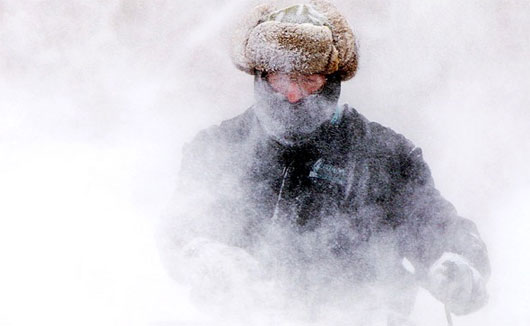How does extreme cold affect the human body?
The United States is trembling against the record cold: storms and icy winds have caused the temperature to drop to -57 degrees C. Many people worry, such a terrifying cold can be How does it affect the human body?
Polar vortex is currently sweeping across the North American continent, bringing scenes often associated with the Arctic or Antarctic. Huge snow showers and intense winds caused the temperature to drop sharply to a record low. In some areas of the United States, such as Indiana, except for essential emergency vehicles, all vehicles are prohibited from traveling on the road. People are being advised to stay indoors to maintain warmth.
The human body is not created for the polar cold . Most of us live in temperate and tropical climates. Only a few ethnic groups have adapted to extreme extreme climatic extremes, such as the Inuit in Canada and the Nenets like northern Russia. The vast majority of modern people have never experienced living in the cold down to -50 degrees Celsius. Although the ingenuity and dexterity have helped us create warm clothing and technology to cope with the cold, confronting the most extreme extreme snowstorms is really not easy.

What happens when we get cold? The human body has several protective mechanisms to try to increase body temperature when cold.Our muscles will be shaky and our teeth will clash. Our hair / hair will stand up and skin will form a "goose bump" phenomenon, an evolutionary reflection from our ancestors that has fur covered. The hypothalamus, which acts as the body's thermostat, stimulates these reactions to keep the body's vital organs warm, at least until it can find some kind of warmth and refuge.
The task of the hypothalamus is to keep the middle body warm at all costs, to sacrifice the limbs if necessary. That's why we always feel needles in fingers and toes in extreme cold. At that time, the body is keeping warm blood near the central area, squeezing the blood supply in the external areas, such as our hands and feet. In extreme colds, and especially if we expose exposed skin to the outside, this effect can lead to frostbite. Reduced blood circulation and warm anemia can lead to tissue freezing as well as breakage.
So, how do other warm-blooded animals live in such harsh climates, while we can't? The answer is, polar animals are either covered in thick, cold fur, which captures warm air near the body, or the body possesses large amounts of fat, sometimes nearly ten centimeters thick. Fat does not transfer heat well, so it keeps heat inside the body.
People, with bare skin and relatively low fat, are therefore not suitable for such an icy environment. However, we have learned how to imitate these qualities. For example, scientists at Antarctic research stations dressed in layers to keep warm air near a fur-like body.
Another problem with the type of weather that is currently affecting the United States is that it can create problems for some things that people depend on. For example, the weight of the tape can break the grid, cutting off the power supply. Unprotected tubes can freeze and burst. And the problem is easy for cars and other vehicles, because the freezing temperature of gasoline is -60 degrees Celsius and the oil is only about -40 degrees Celsius, while the freezing temperature of lubricants Other engines may be higher than that threshold. Diesel oil will usually clump at much warmer temperatures, only around -10 degrees Celsius, unless special additives are added to keep the viscous state in cold weather.
History has also marked some serious stories, warning us of the terrible effects of the extreme cold of the extreme. When Hitler's army invaded Russia in the early winter of 1941, the temperature also dropped to the same level as in the United States today. Thousands of soldiers were frozen to death, in a summer uniform, which was for a brief campaign. Truck and tank engines are frozen, and can only be melted by burning below them. Guns also cannot fire because lubricants solidify. Boiling water when leaving the kitchen can freeze for more than a minute.
- How does the record cold in China affect Vietnam?
- How does extreme cold weather affect your phone?
- Strange reactions of the body with the cold
- How does cold weather affect health?
- It is unbelievable that the ability of the human body to endure
- Cold air rushed in, the Northern temperature dropped below 18 degrees Celsius
- Coming up with perfume
- The reason you are always cold
- Amazing discovery of the human body
- Evening and tonight the cold air will affect the North, storm Nock-ten into the East Sea
- Why is our body hot and cold?
- Cold air is about to affect East North
 Is the magnetic North Pole shift dangerous to humanity?
Is the magnetic North Pole shift dangerous to humanity? Washington legalizes the recycling of human bodies into fertilizer
Washington legalizes the recycling of human bodies into fertilizer Lightning stone - the mysterious guest
Lightning stone - the mysterious guest Stunned by the mysterious sunset, strange appearance
Stunned by the mysterious sunset, strange appearance